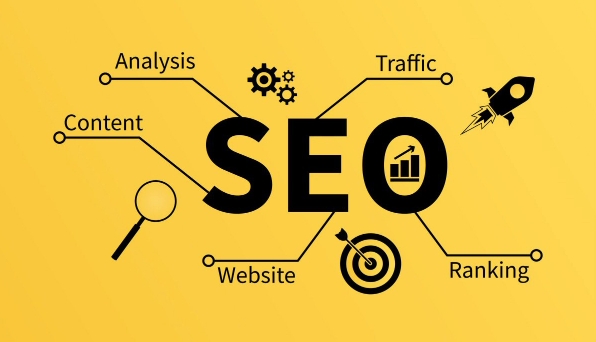To improve your page’s search engine ranking, focus on four key SEO factors. 1. High-quality, relevant content is essential — write clearly, answer user questions, and provide real value without unnecessary fluff. 2. Optimize on-page SEO elements including title tags, meta descriptions, headers, and clean URLs to help search engines understand and promote your content. 3. Earn backlinks from trustworthy and relevant websites to build authority, avoiding spammy or paid links. 4. Ensure strong technical SEO by improving page speed, mobile-friendliness, structured data, and site architecture for better crawling and user experience.

Google and other search engines use complex algorithms to determine which pages rank where, but some SEO factors are consistently important. If you want your page to show up when people search for topics related to your content or business, here are the main things you should focus on.

1. High-Quality, Relevant Content
This is probably the most basic and long-standing ranking factor. Search engines aim to give users the best possible results, so they favor pages that provide real value. That means your content should be well-written, informative, and directly address what users are searching for.

- Make sure your content answers common questions related to your topic
- Use clear language and structure (headings, bullet points, short paragraphs)
- Avoid fluff — don’t stretch a 300-word idea into 800 words just to hit a target
It’s not enough to write something; it has to be better than what’s already ranking. That doesn’t always mean longer — sometimes it just means more organized or easier to understand.
2. On-Page SEO Elements
On-page SEO refers to how well your individual web pages are optimized for both users and search engines. These are the behind-the-scenes details that help Google understand what your page is about.

Important elements include:
- Title tags – should include your main keyword and be under 60 characters
- Meta descriptions – while not a direct ranking factor, they influence click-through rates
- Headers (H1, H2, etc.) – use them to structure your content and include relevant keywords naturally
- URL structure – keep URLs short, descriptive, and keyword-friendly
A lot of people overlook small changes like tweaking title tags or improving headers, but those can have a noticeable impact over time.
3. Backlinks from Trustworthy Sites
Backlinks are still one of the strongest signals Google uses to judge a website’s authority. A backlink is basically a vote from another website saying, “This page is useful.” But not all backlinks are equal — quality matters more than quantity.
- Links from high-authority websites (like news outlets or industry leaders) carry more weight
- Relevance also plays a role — a link from a site in your niche is better than a random one
- Avoid spammy or paid links — they can hurt your rankings instead of helping
Earning good backlinks takes time and effort, but it’s worth focusing on if you’re serious about SEO.
4. Technical SEO and Site Performance
Even if your content is great and you have solid backlinks, poor technical setup can hold you back. Search engines need to be able to crawl and index your site easily.
Some key areas to check:
- Page speed – slow pages frustrate users and hurt rankings
- Mobile-friendliness – more than half of web traffic comes from mobile devices
- Structured data – helps search engines understand your content and may lead to rich snippets
- Clean site architecture – makes it easier for both users and crawlers to navigate
Technical SEO might sound intimidating, but many issues can be fixed with basic tools or plugins, especially if you're using platforms like WordPress.
That's pretty much it — not magic, just consistent effort across these core areas.
The above is the detailed content of What are the most important SEO ranking factors?. For more information, please follow other related articles on the PHP Chinese website!

Hot AI Tools

Undress AI Tool
Undress images for free

Undresser.AI Undress
AI-powered app for creating realistic nude photos

AI Clothes Remover
Online AI tool for removing clothes from photos.

Clothoff.io
AI clothes remover

Video Face Swap
Swap faces in any video effortlessly with our completely free AI face swap tool!

Hot Article

Hot Tools

Notepad++7.3.1
Easy-to-use and free code editor

SublimeText3 Chinese version
Chinese version, very easy to use

Zend Studio 13.0.1
Powerful PHP integrated development environment

Dreamweaver CS6
Visual web development tools

SublimeText3 Mac version
God-level code editing software (SublimeText3)

Hot Topics
 Google Search Console now lets you set your shipping and return policies
Jun 13, 2025 am 10:26 AM
Google Search Console now lets you set your shipping and return policies
Jun 13, 2025 am 10:26 AM
Google now allows you to define your shipping and return policies directly within Google Search Console. According to Google, settings configured in Search Console will override those defined on your website, including any product-level merchant list
 How to protect deep work time and retain focus as an SEO
Jun 19, 2025 am 10:07 AM
How to protect deep work time and retain focus as an SEO
Jun 19, 2025 am 10:07 AM
For any SEO professional, staying focused and productive can be a challenge.With constant algorithm updates, changing trends and a barrage of emails and notifications, it can feel like you’re always playing catch-up.That’s where deep work sessions co
 WordPress 6.5 gains lastmod date for sitemaps files
Jun 23, 2025 am 09:42 AM
WordPress 6.5 gains lastmod date for sitemaps files
Jun 23, 2025 am 09:42 AM
WordPress version 6.5 now includes support for the lastmod element in sitemap files, which can help search engines identify new or updated content. This enhancement may improve crawl efficiency and reduce server load.Lastmod. The lastmod element can
 Mastering SEO account management: The recipe for success
Jun 13, 2025 am 11:21 AM
Mastering SEO account management: The recipe for success
Jun 13, 2025 am 11:21 AM
SEO is full of challenges, but among the hardest is account management. In this article, I’ll share some tips on: Keeping clients happy. Knowing how to balance work and account management. When to push back. How to manage stress.
 Google AI Overviews, clicks and traffic impact: Unraveling the mystery
Jun 22, 2025 am 09:42 AM
Google AI Overviews, clicks and traffic impact: Unraveling the mystery
Jun 22, 2025 am 09:42 AM
Google started including AI Overviews (AIO) in U.S. search results on May 14. While Google has made vague references to the fact that links within AIO may experience higher click-through rates (CTRs), it remains unclear when directly questioned about
 11 of the best free tools every SEO should know about
Jun 14, 2025 am 10:09 AM
11 of the best free tools every SEO should know about
Jun 14, 2025 am 10:09 AM
Working in SEO requires various tools for research and analysis.We need to understand website performance, market trends, user behavior, competitor activity and the effort needed to achieve our goals.While premium tools offer many useful features, se
 Nearly 60% of Google searches end without a click in 2024
Jun 14, 2025 am 10:45 AM
Nearly 60% of Google searches end without a click in 2024
Jun 14, 2025 am 10:45 AM
A majority of Google searches – 58.5% in the U.S. and 59.7% in the EU – result in zero clicks. A zero-click search occurs when users end their session or input a new query without clicking on any results.This data comes from a new zero-click search s
 Want to speak at SMX Next? Now's the time to submit a pitch!
Jun 14, 2025 am 10:05 AM
Want to speak at SMX Next? Now's the time to submit a pitch!
Jun 14, 2025 am 10:05 AM
SMX Next is back online November 13-14, zeroing in on what's currently effective in search and how to gear up for 2025.Search marketing is constantly evolving. In 2024 alone, we’ve witnessed major shifts such as significant Google algorithm updates,






